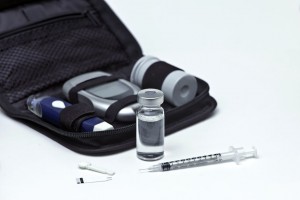For people with diabetes, Medicare Part B will cover blood glucose monitors, test strips, lancet devices, and lancets. In addition, glucose management solutions for those with diabetes are covered whether someone uses insulin or not.
Also covered are, medical nutrition therapy and a number of hours for diabetes self-management training. Some people with diabetes may qualify for therapeutic shoe coverage and foot exams are covered once every six month as long as you haven’t seen a foot care specialist between visits.
Medicare Part B also covers insulin pumps and pump supplies as well as the insulin used specifically in the pump as long as certain requirements are met. Under Medicare Part B, those with diabetes who are on insulin may get up to 300 test strips and 300 lancets every three months and those who have diabetes but don’t use insulin may get up to 100 test strips and 100 lancets every three months. You may be able to get more if your doctor says it is medically necessary and documents this need.
As part of prevention care, within the first year of Part B coverage, you get coverage for a “Welcome to Medicare” physical exam. Then after that, an “Annual Wellness visit” is covered each year. During these visits, a personalized prevention plan is created and used.
When you need to find out if a test, item, or service is covered, you can search it at Medicare.gov.
Compare Medicare Plans now.
How to Get the Brands You Need Covered by Medicare
The rules of Medicare states your doctor can prescribe the specific item or brand of diabetes testing supplies you need. Your doctor must put this in writing and also make a note in your medical record indicating that you need this exact item or brand in order to avoid an adverse medical outcome.
Once your doctor does this, a Medicare contract supplier is required, according to Medicare.gov to do one of the following:
- Give you the exact brand or mode of delivery of the item or service your doctor authorizes for you.
- Help you find another contract supplier that offers that brand or mode of delivery.
- Work with your doctor to find an appropriate alternative brand or mode of delivery and get a revised written prescription.
About Insulin and Medicare Part D
Medicare Part B does not cover insulin unless you use an insulin pump that is considered medically necessary. It also does not cover insulin pens, syringes, needles, alcohol swabs, or gauze.
In the case of an insulin pump, the insulin and the pump may be covered under durable medical equipment in Medicare Part B and for which you’d pay the 20 percent coinsurance. However, you will want to make sure your doctor and contract supplier(s) (local store or pharmacy supplying your pump and insulin) are all enrolled in Medicare.
Medicare Part D (prescription drug coverage) may cover insulin and some medical supplies that are used to inject insulin like syringes, and perhaps even gauze, and alcohol swabs. Medicare Part D does not cover insulin for use in an insulin pump (that may be covered in Part B).
For those with Medicare Part D who need insulin and don’t use a pump, you will have meet your deductible and then pay the copay. To find out how much your insulin, insulin pens, or syringes cost, talk to your doctor or health care provider. What you will pay depends on various factors:
- Other insurance you may have
- How much your doctor charges
- Whether your doctor accepts medicare assignment
- The type of facility
- The location where you get your test, item, or service
Once you pay $4,950 out-of-pocket, then you fall under “catastrophic coverage” which means you pay smaller copays for the rest of the year.
Compare Medicare Plans now.
Medicare and Continuous Glucose Monitors
As of January 12, 2017, people covered by Medicare with type 1 or 2 diabetes who intensively manage their insulin will qualify for coverage for a continuous glucose monitor (CGM).
Firstly, the CGM must be defined as a therapeutic CGM, which means you can make treatment decisions based on the device. As of today, only the Dexcom G5 Mobile system is approved by the FDA for meeting this criteria.
According to CMS, therapeutic CGM may be covered by Medicare when all of the following criteria are met:
- The beneficiary has diabetes mellitus; and,
- The beneficiary has been using a home blood glucose monitor (BGM) and performing frequent (four or more times a day) BGM testing; and,
- The beneficiary is insulin-treated with multiple daily injections (MDI) of insulin or a continuous subcutaneous insulin infusion (CSII) pump; and,
- The patient’s insulin treatment regimen requires frequent adjustment by the beneficiary on the basis of therapeutic CGM testing results.

